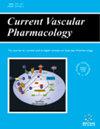QTc Prolongation to Predict Mortality in Patients Admitted with COVID- 19 Infection: An Observational Study
IF 2.8
3区 医学
Q2 PERIPHERAL VASCULAR DISEASE
引用次数: 0
Abstract
Background:: Severe Acute Respiratory Syndrome Coronavirus 2 (SARS-CoV-2) causes Coronavirus disease 2019 (COVID-19), characterized by pulmonary infection ranging from asymptomatic forms to respiratory insufficiency and death. Evidence of cardiac involvement in COVID-19 is increasing, and systemic inflammation or direct heart damage by SARS-CoV-2 can prolong the corrected QT interval (QTc). Methods:: In this observational study, a total of 333 consecutive patients admitted to the Covid Center of Verona University Hospital from November 2020 to April 2021 were included. Patients with bundle branch block, pacemaker-controlled heart rhythm and heart rate >120 beats/min were excluded. A complete electrocardiogram (ECG) was performed at admission, and QTc values of ≥440 ms for males and ≥460 ms for females were considered prolonged. Results:: Overall, 153 patients had prolonged QTc (45.5%). In multivariate logistic regression analysis, male sex (odds ratio (OR)=6.612, p=0.046), troponin (OR=1.04, p=0.015) and lymphocyte count (OR=3.047, p=0.019) were independently associated with QTc prolongation. Multivariate logistic regression showed that QTc was independently associated with mortality (OR=4.598, p=0.036). Age, sex, the ratio between the partial pressure of oxygen (PaO2) and the fraction of inspired oxygen (FiO2) (P/F), and fibrosis-4 index for liver fibrosis (FIB-4) were also independently associated with mortality. Conclusion:: QTc interval prolongation appears to be a frequent finding in patients with COVID-19. Moreover, prolonged QTc may be predictive of more severe forms of COVID-19 and worse outcome.预测 COVID- 19 感染入院患者死亡率的 QTc 延长:一项观察性研究
背景::严重急性呼吸系统综合征冠状病毒 2(SARS-CoV-2)会引起 2019 年冠状病毒病(COVID-19),其特点是肺部感染,从无症状到呼吸功能不全和死亡。COVID-19累及心脏的证据越来越多,SARS-CoV-2引起的全身炎症或直接心脏损伤可延长校正QT间期(QTc)。研究方法在这项观察性研究中,共纳入了 333 名 2020 年 11 月至 2021 年 4 月期间在维罗纳大学医院 Covid 中心连续住院的患者。不包括束支传导阻滞、起搏器控制心律和心率为120次/分的患者。入院时进行完整的心电图检查,男性QTc值≥440毫秒,女性QTc值≥460毫秒即为QTc延长。结果总体而言,153 名患者的 QTc 值延长(45.5%)。在多变量逻辑回归分析中,男性性别(几率比(OR)=6.612,P=0.046)、肌钙蛋白(OR=1.04,P=0.015)和淋巴细胞计数(OR=3.047,P=0.019)与 QTc 延长独立相关。多变量逻辑回归显示,QTc 与死亡率独立相关(OR=4.598,P=0.036)。年龄、性别、氧分压(PaO2)与吸入氧分压(FiO2)之比(P/F)以及肝纤维化的纤维化-4指数(FIB-4)也与死亡率密切相关。结论QTc间期延长似乎是COVID-19患者的常见症状。此外,QTc延长可能预示着更严重的COVID-19和更差的预后。
本文章由计算机程序翻译,如有差异,请以英文原文为准。
求助全文
约1分钟内获得全文
求助全文
来源期刊

Current vascular pharmacology
医学-外周血管病
CiteScore
9.20
自引率
4.40%
发文量
54
审稿时长
6-12 weeks
期刊介绍:
Current Vascular Pharmacology publishes clinical and research-based reviews/mini-reviews, original research articles, letters, debates, drug clinical trial studies and guest edited issues to update all those concerned with the treatment of vascular disease, bridging the gap between clinical practice and ongoing research.
Vascular disease is the commonest cause of death in Westernized countries and its incidence is on the increase in developing countries. It follows that considerable research is directed at establishing effective treatment for acute vascular events. Long-term treatment has also received considerable attention (e.g. for symptomatic relief). Furthermore, effective prevention, whether primary or secondary, is backed by the findings of several landmark trials. Vascular disease is a complex field with primary care physicians and nurse practitioners as well as several specialties involved. The latter include cardiology, vascular and cardio thoracic surgery, general medicine, radiology, clinical pharmacology and neurology (stroke units).
 求助内容:
求助内容: 应助结果提醒方式:
应助结果提醒方式:


